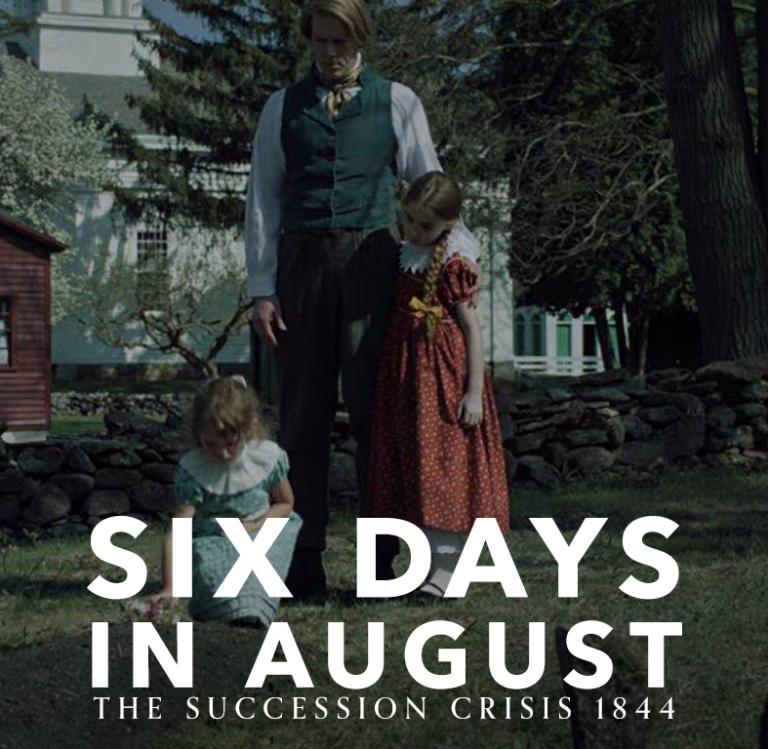
I doubt that many will be going to theaters along the Mormon Corridor this evening to attend screenings of Six Days in August, and not merely because our numbers are dwindling in a shrinking array of movie houses. There is also, of course, the football game tonight between Brigham Young University and the University of Utah — a pair of schools, by the way, that were both founded by President Brigham Young.
Still, I encourage you to see Six Days one more time, if you’ve already seen it, or to repent and see it for the first time if, for reasons best known to you and the Divine Judge, you’ve had the chance to do so but, perhaps on account of the Fall, have thus far wickedly refused to avail yourself of the opportunity.
And I want to say a few words on the subject of the film: I saw a claim today, online, that I (unethically) plowed upwards of four million dollars — and, of course (says the critic), not a penny of my own money — into what the anonymous critic describes as a self-aggrandizing vanity project of mine. Of course, the figure is vastly too high — much as his estimate of the returns from Witnesses and Six Days is substantially too low. We spent nowhere near four million dollars on Six Days. (We had nothing like that amount that we could have spent.) Moreover, my wife and I have been and continue to be donors to all of the activities of the Interpreter Foundation, including its films. In saying that we don’t give any of our own money to such projects, the critic is simply inventing a malicious falsehood out of thin air. (Golly gee! Color me surprised!)
This, though, is important: Even the money that we have spent on the overall Six Days project, however, has paid for things other than the dramatic film. As we were producing footage for the theatrical movie, we were, at the same time, gathering footage for the docudrama or documentary that we have always intended to follow it. Some of the footage will be repurposed scenes from Six Days in August, while other footage will be of scenes that we didn’t use in the dramatic release, and perhaps that we never intended to include but that were always planned for the docudrama. Likewise, we have already recorded lengthy interviews with scholars about the mission of the Twelve to England, Brigham Young, the succession crisis of 1844, and so forth. Those materials are already “in the can,” as it were, which means that the documentary or docudrama is already quite far along.
Has Six Days in August been a failure? Well, it would be disingenuous on my part to say that I’m not disappointed and, frankly, quite surprised by the film’s lackluster performance in theaters. My critics have been gleefully offering explanations for that lackluster performance. They say, for example, that Six Days in August is a terrible, amateurish piece of dreck. But that is simply false. It’s not that. (And, by the way, most of those declaring that it’s a horribly bad film seem never to have watched it.) And they point out that I’m a mean-spirited, vicious, and dishonest buffoon, which leads them to believe that the ticket receipts represent a personal rebuke to me, a repudiation of me and all my works. But I strongly doubt that enough members of the movie-going public are aware of my personal repulsiveness for that fact to play a significant role in the movie’s less-than-stellar box office returns.
Is it, though, a failure? No, not really. First of all, I’m confident that we produced a good, solid film. I’m proud of it. It’s a real contribution to Latter-day Saint filmmaking and to telling the story of the Church of Jesus Christ of Latter-day Saints. Further, it will be around and available for years to come, along with its eventual docudrama sequel. It will (presumably sometime early next year) be accessible via DVD, Blu-ray, and online streaming. We will probably use snippets from it for educational purposes on the Interpreter website. It will be available for classroom use.
With the performance of Six Days in August very much on my mind, the timing and the theme of the remarks recently given at Brigham Young University by the creator of The Chosen, Dallas Jenkins, could not have been better for me. In addition, I hope that they will be helpful to all of those — to our core team of filmmakers, our actors, our donors, and everybody else — who worked and sacrificed to create the film. The recording of his remarks lasts not quite thirty minutes: “Five Loaves and Two Fishes | Dallas Jenkins | 2024”
An article in the Newsroom of the Church of Jesus Christ of Latter-day Saints about his speech at BYU is “Dallas Jenkins of ‘The Chosen’ Urges BYU Students to Embrace Failure and Trust in God.”
And, still speaking of movies: Christopher D. Cunningham offers a critical review of the new Hugh Grant film Heretic that you might find interesting (as well as an acceptable alternative to actually going to see it): “Why “Heretic” Fails as a Critique of Religion and as a Movie”

(Wikimedia Commons public domain image)
I think that I should mention the name of the company through which the Interpreter Foundation ran its educational tour to Guatemala and Mexico. It is Book of Mormon Tours, led by Blake Allen. Thanks to the efforts of Interpreter’s executive vice president, Steve Densley, the tour was custom-designed for Interpreter. So I can’t, with any real authority, generalize from our particular experience to what anybody else will encounter. But our tour went well. The lodging was excellent, the food was good, we saw a large number of the best sites in Mesoamerica and the most relevant sites to the Mesoamerican model of the Book of Mormon, and Blake was a very good guide. He is personable and helpful and accommodating, and an efficient and organized tour director. We were satisfied with our choice of Book of Mormon Tours, and I feel comfortable in recommending them to anybody who might be interested in a tour to Mesoamerica that’s focused on the Book of Mormon.

Finally, I offer an item that I’ve gleaned from the Christopher Hitchens Memorial “How Religion Poisons Everything” File™:
How awful.












